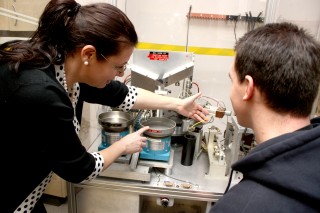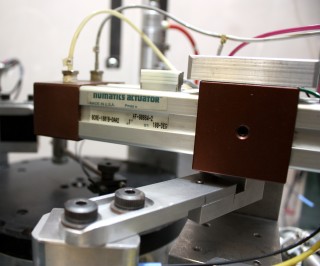This content was published: March 1, 2010. Phone numbers, email addresses, and other information may have changed.
New PCC option focuses on mechatronics,robotics, automation
Photos and story by James Hill
Portland Community College’s Electronic Engineering Technology program at its Sylvania Campus (12000 S.W. 49th Ave.) now has a new, state-approved Mechatronics, Automation, Robotics option.

Sanda Williams, chair of the Electronic Engineering Technology program, shows student Robert Corkran a college automated assembly station.
The new option, which began this winter, dovetails into the larger EET associate’s degree so students can work on both during their time in the program. About 70 percent of the courses fall under the EET program. Students will gain skills in electronic engineering, hydraulics, pneumatics, technology services, computer-assisted design, math, physics, sensors and control circuitry. Graduates can work in manufacturing or on assembly lines, food processing and servicing automated systems, to name a few.
“The newly developed option will prepare technicians to work in manufacturing and servicing of automated systems,” said Sanda Williams, Electronic Engineering Department chair. “Graduates can go to work in the automated industry or they can fully transfer to Oregon Institute of Technology, with which we have a great transfer agreement. We are happy that together with local higher learning institutions and high schools were able to create a great career pathway for the robotics-oriented young students.”
As manufacturers automate their processes to keep competitive in the global marketplace, the mechatronics/automation/robotics option at PCC provides the background needed for future technicians to work with increasingly complex, computer-controlled, electromechanical production equipment. Mechatronics is the study of computer controlled electromechanical systems in the manufacturing and servicing repair fields.
“America’s edge is its innovative technology,” said Dave Zepponi, director of the Northwest Food Processing Association. “The high tech opportunities in food engineering and technology are here to stay. We have to have a replacement workforce with the capacity and desire to optimize the development of reliable robotic technology to improve our productivity. We look forward to the graduates of the technical education courses at PCC to take the places of today’s food processing workforce.”
Under Electronics Engineering Technology, PCC offers options in Biomedical Engineering Technology, Renewable Energy Systems (wind, solar, fuel cell and others) and Wireless and Data Communication. The program is accredited through the Northwest Association of Schools and Colleges Commission. In addition, the program provides day and evening courses, “real-world” training, and quality instruction from those who possess advanced degrees and a broad range of industry experience.
The EET program has been hot. It has experienced 128 percent enrollment growth since last year and has surged from 12 students in 2005 to 150 today.
For more information about this new option, contact Sanda Williams, instructor and department chair of Electronic Engineering Technology program, at (503) 977-4527, sanda.williams@pcc.edu.

